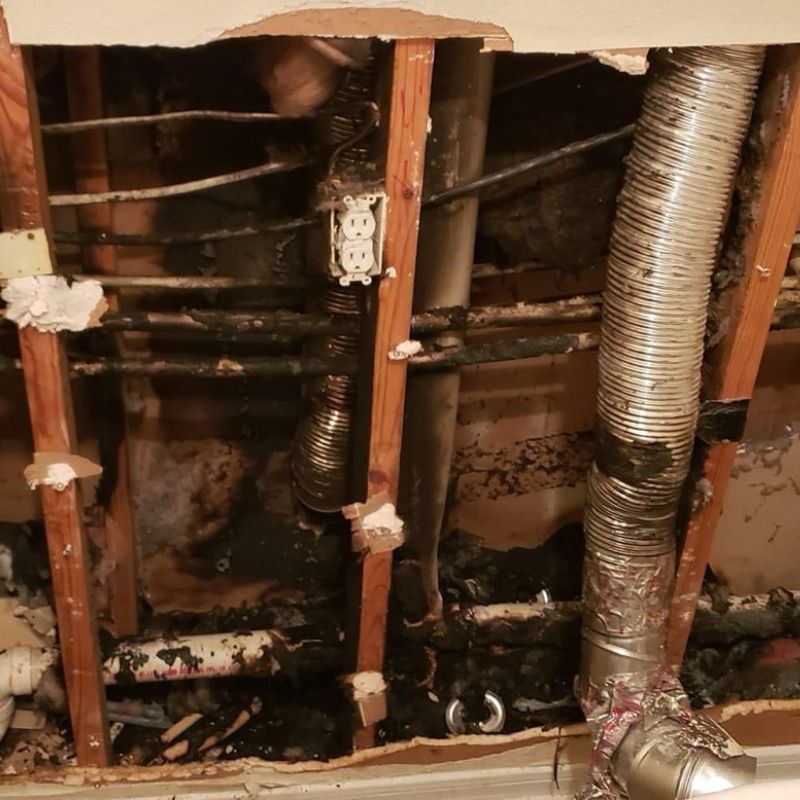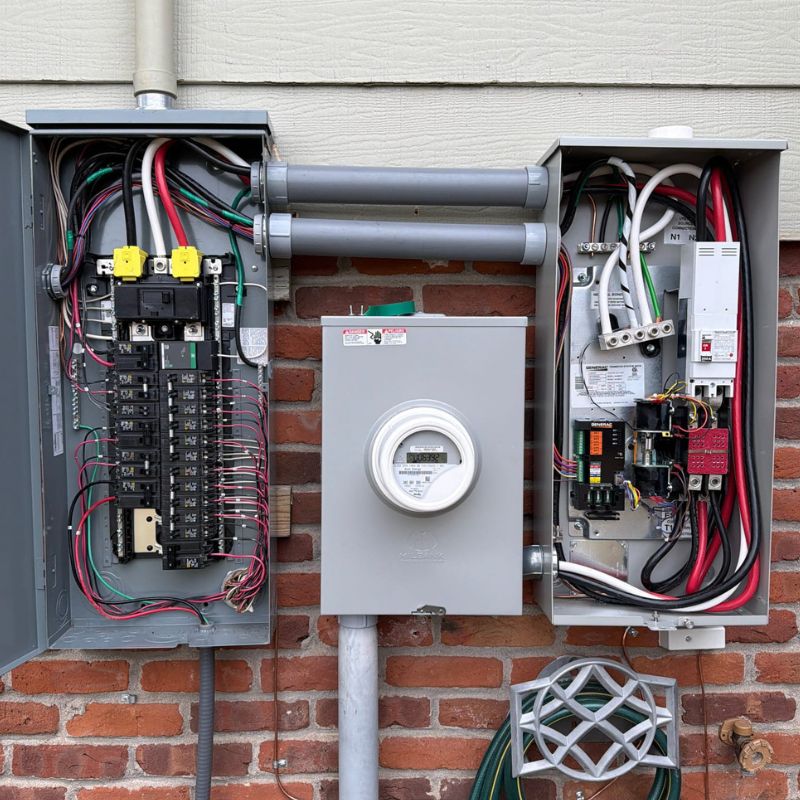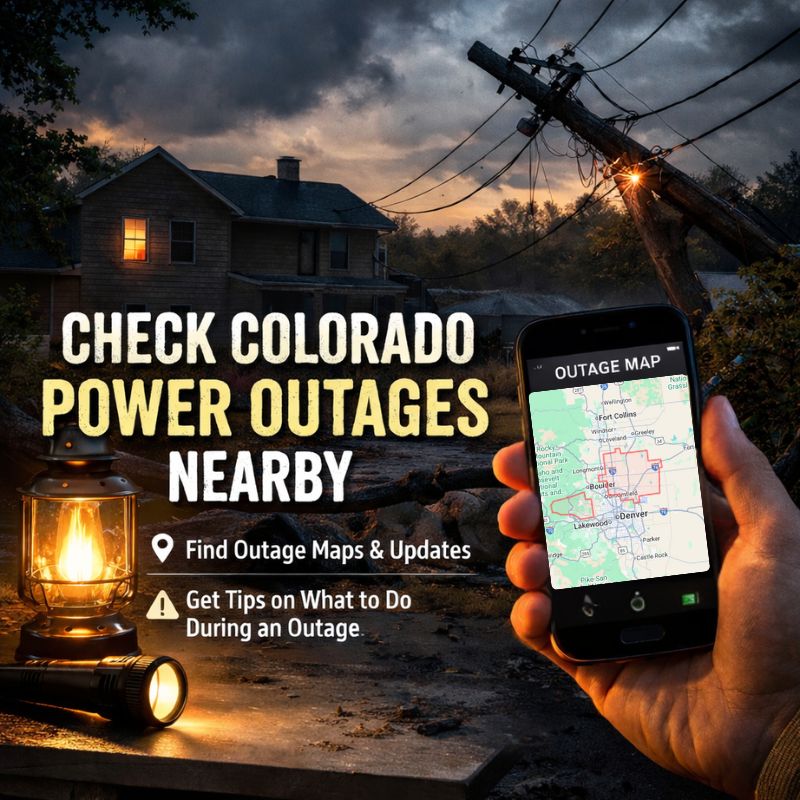Contents
- How to Plan Electrical Upgrades During Commercial Renovation
- Why Electrical Planning is Critical in Commercial Renovations
- Step 1: Evaluate Your Existing Electrical System
- Step 2: Plan for Electrical Panel Upgrades
- Step 3: Consider Electrical Infrastructure Upgrades
- Step 4: Coordinate With Your General Contractor
- Step 5: Hire the Right Commercial Electrician in Colorado
- FAQs About Commercial Electrical Upgrades
- Final Thoughts
Trusted Colorado Electricians
How to Plan Electrical Upgrades During Commercial Renovation
When you are planning a commercial renovation in Colorado, it is easy to get caught up in the fun details, like new flooring, sleek fixtures, or finally ditching the fluorescent lights that make everyone look like a ghost.
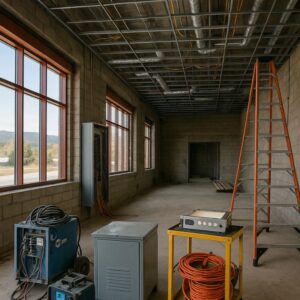
But here is the reality: if you overlook your commercial electrical upgrades, your project can stall, your costs can skyrocket, and your building may not even pass inspection.
At The Electricians, we have seen it all, from outdated commercial breaker boxes that cannot handle modern loads, to businesses that assumed their old wiring could power today’s tech-heavy offices. Spoiler alert: it could not.
In this guide, we will walk you through how to plan for electrical infrastructure upgrades during your renovation, why timing matters, and what questions you should ask along the way.
Why Electrical Planning is Critical in Commercial Renovations
A commercial renovation is not just about updating your space, it is about future-proofing your business. With more reliance on technology, automation, and energy-intensive systems (think HVAC, security, and EV charging stations), your electrical system needs to support both today and tomorrow.
Key reasons to prioritize electrical planning:
- Code compliance: Colorado follows the National Electric Code (NEC), and failing to meet standards can delay your project.
- Capacity needs: Old commercial electrical panels often cannot support modern demands.
- Safety: Overloaded systems can lead to short circuits, electrical fires, or costly downtime.
- Efficiency: Smart upgrades now can lower electricity costs and improve energy savings long term.
Step 1: Evaluate Your Existing Electrical System
Before breaking ground on your renovation, a licensed commercial electrician should evaluate:
- Current load vs. demand – How much power your business uses compared to what your system can handle.
- Condition of wiring – Wires and cables deteriorate over time, leading to safety risks.
- Breaker box and panels – Many buildings still rely on outdated or undersized commercial breaker boxes that cannot be safely expanded.
- Future needs – Consider upcoming tech like smart building systems, EV chargers, or industrial equipment.
Think of this step as your “electrical check-up.” Just like you would not run a marathon without training (unless you enjoy medical bills), you should not renovate without knowing your electrical baseline.
Step 2: Plan for Electrical Panel Upgrades
One of the most common needs in a commercial renovation is electrical panel upgrades for commercial buildings.
Here is why:
- Old panels may not provide enough circuits.
- Breakers may trip constantly under new loads.
- Some panels (looking at you, Federal Pacific and Zinsco) are considered unsafe and must be replaced.

If your building requires a commercial electrical panel replace, it is better to address it before walls are closed up or expensive finishes are installed.
This is also where the 80% rule for electrical panels comes into play.
What is the 80% Rule for Electrical Panels?
The 80% rule states that you should not load a panel beyond 80% of its rated capacity for continuous loads. For example, a 100-amp panel should not exceed 80 amps under normal operating conditions.
This prevents overheating, reduces fire risk, and ensures you have capacity for peak demands.
Ignoring this rule is like filling a coffee cup to the brim and then trying to walk across the office. It is not going to end well.
Step 3: Consider Electrical Infrastructure Upgrades
Beyond the panel, you may need broader electrical infrastructure upgrades. These can include:
- Service capacity increases – Upgrading from 200A to 400A or more to handle higher loads.
- Dedicated circuits – For data centers, kitchen equipment, or medical devices.
- Energy efficiency upgrades – Smart panels, LED lighting, and energy monitoring systems.
- Backup power – Adding generators or battery storage for business continuity.
In Colorado, many municipalities also encourage energy-efficient commercial renovations through rebates and incentives. Planning ahead can help you take advantage of these savings.
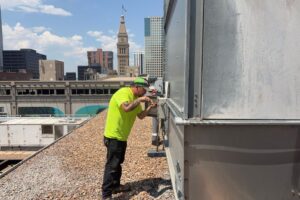
Step 4: Coordinate With Your General Contractor
Electrical work is not a “set it and forget it” task. It must be coordinated with your GC and other trades. For example:
- HVAC requires proper circuits.
- Commercial lighting layout should be finalized before drywall goes up.
- Fire alarm systems need dedicated wiring and inspections.
Early coordination saves time, prevents rework, and ensures everyone is literally on the same circuit (pun intended).
Step 5: Hire the Right Commercial Electrician in Colorado
The truth is, not all electricians are created equal. Commercial work requires expertise in larger loads, specialized equipment, and strict code compliance.
At The Electricians, we specialize in commercial electrical upgrades across Colorado.
From commercial electrical panel upgrades to complete electrical infrastructure upgrades, our dedicated commercial electricians ensure your renovation is safe, compliant, and ready for the future.
FAQs About Commercial Electrical Upgrades
How do I know if my building needs a new panel?
If your lights flicker, breakers trip often, or your equipment strains to start, it is time to evaluate your commercial electrical panel.
How long does a commercial panel replacement take?
Most commercial electrical panel replace projects can be completed in 1–3 days, depending on complexity. Larger infrastructure upgrades may take longer.
Can I expand my current panel instead of replacing it?
Sometimes yes, but often no. Many older panels were not designed for expansion or may no longer meet code. A full upgrade may be the safer option.

Does Colorado require inspections for panel upgrades?
Yes. All electrical panel upgrades for commercial buildings must meet Colorado NEC standards and pass local inspections.
Final Thoughts
A successful commercial renovation is not just about aesthetics, it is about creating a building that functions safely and efficiently for decades.
By prioritizing your commercial electrical upgrades, you avoid costly mistakes, ensure compliance, and set your business up for long-term success.
If you are planning a renovation in Colorado and want an expert team that contractors and GCs trust, call The Electricians.
We are the go-to professionals for commercial electrical panels, electrical infrastructure upgrades, and everything in between.
Call The Electricians today and let us help you power up your renovation the right way.
Related Posts
If you enjoyed reading this, then please explore our other articles below:
Electrical Panels in Colorado Homes
Many homes across Colorado, especially in Denver, Aurora, Lakewood, and Colorado Springs, were built with electrical panels that were never designed for modern power demands. Cold winters, EV charging, home offices, and newer appliances place added stress on older panels and breakers.
If you are noticing frequent breaker trips, buzzing sounds, or planning an upgrade like an EV charger or heat pump, a licensed Colorado electrician can evaluate whether your panel needs repairs or a full power upgrade.
